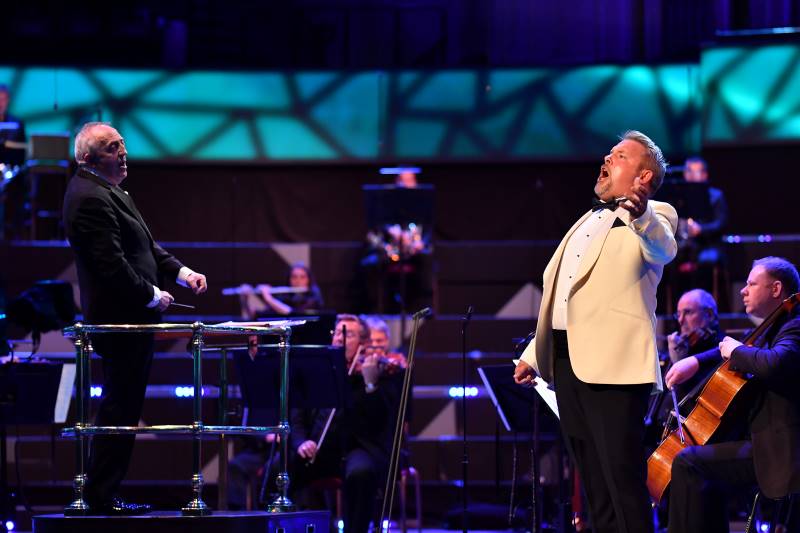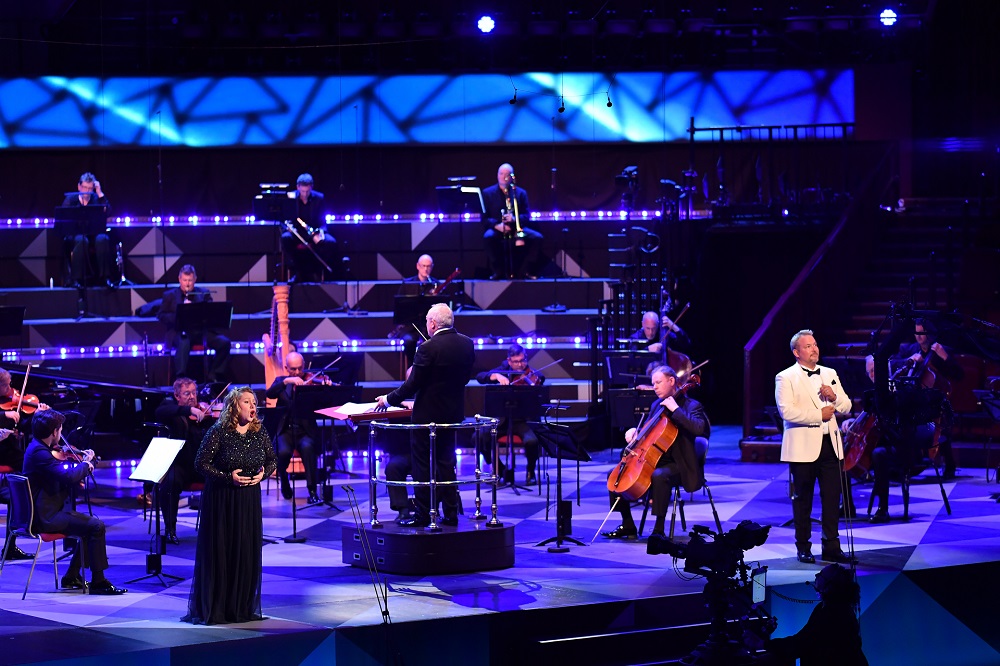BBC Proms live online: Viennese Night review - sophisticated pleasures | reviews, news & interviews
BBC Proms live online: Viennese Night review - sophisticated pleasures
BBC Proms live online: Viennese Night review - sophisticated pleasures
Lehar's 150th birthday bash goes retro, and ends up sounding fresher than ever
Viennese operetta is like that other great Central European treat, goulash. It comes in many forms. In Vienna it’s coffeehouse comfort food; in Slovenia they add bacon for a smoky tang. And in the marketplaces of Transylvania it comes in bubbling iron cauldrons, practically fluorescent with paprika. But it’s all goulash. You know it when you taste it, and all that matters is that it tastes good.
Which is by way of saying that I can’t honestly get too worried about the authenticity or otherwise of the BBC Proms Viennese Night: a 150th birthday tribute to Franz Lehár (and it was about time someone offered one) that ranged freely through his Viennese predecessors, contemporaries and (in the case of Emmerich Kálmán) rivals. Bramwell Tovey conducted the BBC Concert Orchestra and Sophie Bevan (main picture) and Robert Murray (pictured below) were the soloists in an unaccountably untelevised programme assembled (to judge from the arrangers listed on the BBC website) from vintage light orchestra arrangements that had presumably been yellowing in a corner of the BBC Music Library since around the time the Light Programme got the chop. Memo to followers of Marie Kondo: throw nothing away. You never know when it might come in useful.
Because with this repertoire, performed this affectionately, you’d better believe that these distinctly retro arrangements spark joy. Scaled down for socially distanced orchestra, Lehár’s 1940 vintage Merry Widow overture shimmered and danced, with piano and harp glinting and rippling through silken, translucent string textures. No whipped cream indulgence here; Tovey shaped the beloved melodies with a buoyancy and a rhythmic flair that made them sound as fresh as they deserve to be – as fresh, in fact, as they always were. The introduction to the Gold and Silver Waltz had the swinging élan of a military march: appropriately, since Lehár was a bandmaster with the Imperial and Royal Army at the time that he wrote it. 

I was going to say “unfamiliar”, but that’s not actually true. In the 2018-19 season, Operabase tells us that among 20th century operas only Puccini and West Side Story received more performances, globally, than Lehár’s The Merry Widow and Kálmán’s Csárdásfürstin. Britten, Berg, Janáček, and Strauss (R)? Not even within hailing distance. Beyond these shores, this stuff is big box-office, and with good reason. In normal times, Lehár’s anniversary might have been a chance for a more thorough retrospective (goodness knows, there’s plenty there to rediscover). But these are not normal times, and perhaps the highest praise I can give this Prom is that for 90 minutes it did exactly what operetta has always done: offered unstinting – but far from unsophisticated – delight.
- Watch this concert on the BBC iPlayer and/or listen on BBC Radio 3 for the next month
- Full programme of livestreamed BBC Proms here
- More classical music reviews on theartsdesk
rating
Share this article
Add comment
The future of Arts Journalism
You can stop theartsdesk.com closing!
We urgently need financing to survive. Our fundraising drive has thus far raised £49,000 but we need to reach £100,000 or we will be forced to close. Please contribute here: https://gofund.me/c3f6033d
And if you can forward this information to anyone who might assist, we’d be grateful.

Subscribe to theartsdesk.com
Thank you for continuing to read our work on theartsdesk.com. For unlimited access to every article in its entirety, including our archive of more than 15,000 pieces, we're asking for £5 per month or £40 per year. We feel it's a very good deal, and hope you do too.
To take a subscription now simply click here.
And if you're looking for that extra gift for a friend or family member, why not treat them to a theartsdesk.com gift subscription?
more Classical music
 From Historical to Hip-Hop, Classically Black Music Festival, Kings Place review - a cluster of impressive stars for the future
From quasi-Mozartian elegance to the gritty humour of a kitchen inspection
From Historical to Hip-Hop, Classically Black Music Festival, Kings Place review - a cluster of impressive stars for the future
From quasi-Mozartian elegance to the gritty humour of a kitchen inspection
 Shibe, LSO, Adès, Barbican review - gaudy and glorious new music alongside serene Sibelius
Adès’s passion makes persuasive case for the music he loves, both new and old
Shibe, LSO, Adès, Barbican review - gaudy and glorious new music alongside serene Sibelius
Adès’s passion makes persuasive case for the music he loves, both new and old
 Anja Mittermüller, Richard Fu, Wigmore Hall review - a glorious hall debut
The Austrian mezzo shines - at the age of 22
Anja Mittermüller, Richard Fu, Wigmore Hall review - a glorious hall debut
The Austrian mezzo shines - at the age of 22
 First Person: clarinettist Oliver Pashley on the new horizons of The Hermes Experiment's latest album
Compositions by members of this unusual quartet feature for the first time
First Person: clarinettist Oliver Pashley on the new horizons of The Hermes Experiment's latest album
Compositions by members of this unusual quartet feature for the first time
 Gesualdo Passione, Les Arts Florissants, Amala Dior Company, Barbican review - inspired collaboration excavates the music's humanity
At times it was like watching an anarchic religious procession
Gesualdo Passione, Les Arts Florissants, Amala Dior Company, Barbican review - inspired collaboration excavates the music's humanity
At times it was like watching an anarchic religious procession
 Classical CDs: Camels, concrete and cabaret
An influential American composer's 90th birthday box, plus British piano concertos and a father-and-son duo
Classical CDs: Camels, concrete and cabaret
An influential American composer's 90th birthday box, plus British piano concertos and a father-and-son duo
 Cockerham, Manchester Camerata, Sheen, Martin Harris Centre, Manchester review - re-enacting the dawn of modernism
Two UK premieres added to three miniatures from a seminal event of January 1914
Cockerham, Manchester Camerata, Sheen, Martin Harris Centre, Manchester review - re-enacting the dawn of modernism
Two UK premieres added to three miniatures from a seminal event of January 1914
 Kempf, Brno Philharmonic, Davies, Bridgewater Hall, Manchester review - European tradition meets American jazz
Bouncing Czechs enjoy their Gershwin and Brubeck alongside Janáček and Dvořák
Kempf, Brno Philharmonic, Davies, Bridgewater Hall, Manchester review - European tradition meets American jazz
Bouncing Czechs enjoy their Gershwin and Brubeck alongside Janáček and Dvořák
 Solomon, OAE, Butt, QEH review - daft Biblical whitewashing with great choruses
Even a top soprano and mezzo can’t make this Handel paean wholly convincing
Solomon, OAE, Butt, QEH review - daft Biblical whitewashing with great choruses
Even a top soprano and mezzo can’t make this Handel paean wholly convincing
 Two-Piano Gala, Kings Place review - shining constellations
London Piano Festival curators and illustrious friends entertain and enlighten
Two-Piano Gala, Kings Place review - shining constellations
London Piano Festival curators and illustrious friends entertain and enlighten
 Echo Vocal Ensemble, Latto, Union Chapel review - eclectic choral programme garlanded with dance
Beautiful singing at the heart of an imaginative and stylistically varied concert
Echo Vocal Ensemble, Latto, Union Chapel review - eclectic choral programme garlanded with dance
Beautiful singing at the heart of an imaginative and stylistically varied concert
 Scott, Irish Baroque Orchestra, Whelan, RIAM, Dublin review - towards a Mozart masterpiece
Characteristic joy and enlightenment from this team, but a valveless horn brings problems
Scott, Irish Baroque Orchestra, Whelan, RIAM, Dublin review - towards a Mozart masterpiece
Characteristic joy and enlightenment from this team, but a valveless horn brings problems

Comments
I like a good schnitzel as
Superb concert One of the